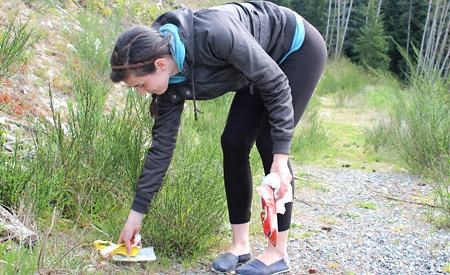Collectively, people live on a planet that is delicate yet littered with plastics, cardboard, wasted food and electronics illegally dumped in ditches or on back roads. But on Earth Day, Sunday April 22, attention is called to an issue that is no longer so secret.
Billions around the world mark Earth Day as a time to speak up about the need to protect the planet. Events take place globally and here in Powell River the time of year is marked with an annual community cleanup.
In the last two years, more than 250 people have gathered to collect trash that is illegally discarded along power lines and beside lakes. Pulling everyone together is Trash Bash and on Saturday, April 28, organizer Abby McLennan, with the Let’s Talk Trash team, is hoping even more people will come out to help clean up the community.
“It’s people dumping anything from baby diapers to yard waste to appliances to renovation materials,” she said. “What is really sad to see is some material that is free to dispose of being illegally dumped. Metals are valuable recyclable materials.”
Powell River Regional District has been involved in an annual garbage pickup for four years and financially contributed to other volunteer efforts many years before that. There are many ways waste can be reduced and recycled. The Let’s Talk Trash team and the regional district made a waste wise guide calendar available to download on the regional district’s website. According to the calendar over 75 per cent of waste can be recycled and what can’t be, can often be composted.
Small appliances, batteries and smoke and carbon monoxide detectors are all free to recycle, as are paints and pesticides, solvents and gasoline.
The Return-It depot accepts electronics such as display devices, computers, scanners, printers, non-cellular phones, home audio and video systems, and portable audio and video systems. These items can be recycled for free.
Construction and demolition waste is more expensive to dispose of at $200 per ton at Augusta Recyclers.
McLennan said over the last two years Trash Bash has gathered just over 17 tons of waste. “Duck Lake is the big one and along the power lines. All places that are easy access for people, not to have to drive too far and then to dump what they don’t want to pay for.”
Recycling paper, cardboard and plastics is free in town. Green bins are located in the Canada Safeway parking lot, at the north end of Town Centre Mall, Tla’Amin First Nation’s Sliammon Salish Centre and at Black Point Store.
“If it’s household waste, it’s $2 a bag in town if you buy the sticker,” said McLennan. “There’s a $5 minimum at Augusta. It’s affordable for some people but maybe not for others. Leaf and yard waste, you have to pay to get rid of that but there’s lots of options for that. It’s a compostable material which a lot of people really value.” She added that yard and leaf waste is all right to put back into the environment.
Another easy way of contributing to the environment’s cleanliness is through the Adopt a Highway program coordinated by BC ministry of transportation and infrastructure. It is a roadside maintenance and enhancement initiative for people interested in volunteering to adopt a section of highway and to keep it clean for a minimum two-year term.
Anne Baker, president elect of the Rotary Club of Powell River, said it is one of the easiest ways to volunteer and give back to the community. “It’s fun and it also creates some awareness from the sign that is up year-round saying that Rotary is taking responsibility for this area,” she said. “And then people are driving by and honk their horns or stop and say thanks. It’s a neat little way of being able to take some pride in some part of keeping things clean.”
Baker and the Rotary Club helped to bring the Adopt a Highway program to Powell River. She said volunteers are only required to pick up garbage four times a year. Other activities can include pulling weeds and spotting, reporting or pulling non-toxic invasive plants. Three people is the minimum group size.
“We’ve done it six times now,” said Baker. “We usually get between 12 and 15 people who show up and it’s done in an hour. Then I pick up the full bags and pile them in one spot and then highways will pick them up the next morning.”
The experience is rewarding, Baker explained. “It makes you feel you’re making a difference in just one hour of volunteering. It’s kind of fun to see what weird pieces of garbage you find and who finds the strangest thing. It makes you feel like you’re giving back to the community and contributing.”
McLennan said that such events as Trash Bash or the Adopt a Highway program are a good way of making people aware of the impact of illegal dumping. She added people might feel a bit more empowered to stop or prevent illegal dumping if they just know how big of a problem it really is.
But enforcing laws on illegal dumpers can be tough, McLennan explained. If someone witnesses it, they can catch the licence plate number of the suspect and report it to the RCMP but it’s not easy to enforce the laws.
“It’s such a big problem and it’s not just one or two people doing it, it’s quite a few people,” she said. This makes it all the more important to have an annual cleanup event. “A lot of our back road areas get cleaned up which I don’t think otherwise would be. It’s a great way for people to give back to the community by spending their Saturday morning picking up other people’s illegally dumped garbage.”
Readers can pre-register for Trash Bash by calling 604.483.3231 or by email at [email protected]. Readers who are interested in Adopt a Highway can visit the program's website.



